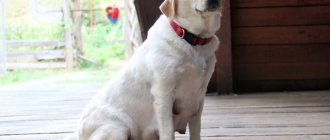German shepherds and the question of how long do representatives of the breed live is one of the most common. This is understandable; every owner tries to prolong the life of his friend. Germans are exceptional animals, naturally intelligent, with excellent performance characteristics. At the age of 10 years, the dog is considered an older dog and requires more careful care and less workload.
Let's try to figure out what life expectancy depends on and how to increase this period for your beloved dog.
How many years do shepherd dogs live on average?
The average life expectancy of a German Shepherd is 12 years. At the age of 8 - 9 years, the dog reaches old age; from the age of 10 it is considered an elderly dog. Life expectancy itself depends on many factors influencing it: from external data to nutrition, care and genetic predisposition.
- A baby brought into the home at the age of 2–3 months is just preparing to become an adult; during this period, he especially needs monitoring of all vital signs.
- Shepherd dogs officially reach adult age at 1.5 years. A fully formed dog from the point of view of anatomy and physiology - by 2 full years.
- From 3 years to 6, she is at her prime, young and active, she enjoys life and gives unforgettable emotions to her owner.
- From 7 to 9 years old, the first signs of change and aging are possible, old injuries worsen, vision deteriorates, and dental problems appear.
- At 10–11 years old, the dog officially receives the status of “senior” and requires special care and attention.
- At the age of 12 - 15 years, a shepherd dog is already considered a long-liver; at this age, it is necessary to show special respect for it, make life as easy as possible and show increased concern for your pet.
How to increase the lifespan of a German Shepherd
Many owners strive to extend the life of their beloved four-legged friend.
Here are a few rules to follow:
Monitor your dog's weight
Obesity is harmful even to a young body, but for an older animal it is deadly. Excess weight is an increased load on joint tissues, which leads to arthrosis, arthritis and other diseases. The internal organs become covered with a thick layer of fat and can no longer function normally. Be sure to monitor the amount of food your dog eats. It is better to keep an older shepherd in condition in which the ribs can be clearly felt.
Availability of daily exercise
Many animals whose age has “exceeded” 10-11 years prefer to lie down more and refuse long walks. But movement is vital for shepherd dogs. Make your pet go out for at least a short walk, and stop to rest if necessary.
Eliminate stress
Make your four-legged friend happy more often. It is unknown how long an elderly animal will live, so communicate with it every day, pet the dog, and offer it its favorite treats. Do not bring new pets into your home, as this may negatively affect the health of an older animal.
Regular checks with a veterinarian
Take your dog to the doctor often. Every six months you need to take urine and blood tests, this will allow you to detect the development of the disease in time and begin treatment.
Continue to give your animal mental stimulation
Shepherds are in dire need of regular exercise. Even if your pet has become elderly, do not stop learning new commands and repeating old ones.
Weight
The owner, as a person who has taken responsibility for the pet, must be aware of the importance of nutrition and lifestyle. An overweight animal with a sedentary lifestyle is thousands of times more susceptible to cardiovascular diseases. Also, excess weight is an additional burden on joints and blood vessels.
Ways to increase your pet's lifespan
The main factor influencing the longevity and health of a dog is proper nutrition and not overeating. In this case, on average, German Shepherds live a long time.
Physical activity is mandatory for dogs, as at the beginning of life it contributes to the formation of muscles, bones and joints, and then has a positive effect on maintaining a healthy state of the body.
Training and communication with the owner are also important, this makes the dog calm and happy. And you should always remember about regular visits to the veterinarian and following his recommendations.
The German Shepherd is a grateful and intelligent pet that can become a full-fledged member of the family. In order for a dog to have a long and happy life, it is necessary to monitor its health and nutrition from birth.
Exercise and activity
Understand that a dog is not a beautiful addition, it is a living creature for which you are responsible in the same way as you are to your children. The dog cannot sit on the sofa 24/7 and under no circumstances should he be on a chain. This is a friend, companion, comrade who requires attention, games, discovery of new places and his abilities.
The dog must undergo training, communicate with its brothers and people. Do not abuse the animal, do not leave it to live on a chain with an environment of 2 meters.
How old your German Shepherd lives depends on you, remember this.
average life expectancy
The Germans, as the owners of this breed lovingly call their charges, unfortunately, are not considered long-livers. The exact science of statistics determines how long German Shepherds live on average. Their average age is estimated at 13-15 years. But this does not mean that all dogs, having reached the age of thirteen, will necessarily leave their owner. With proper care and the absence of hereditary problems, Germans live for several more years after this fatal date.
Did you know? The most famous long-lived shepherd is considered to be a Georgian female German shepherd named Lada f. Zellerland, who lived a full 27 years.
In fact, it is almost impossible to get a clear idea of how long a certain individual will stay near you. Even if you know all the diseases that visited your pet’s ancestors up to the seventh generation, it is impossible to predict whether such a sore will “come out” along his life’s path, or whether the dog’s body will not even “remember” about it.
Both life's troubles and unforeseen events shorten a dog's life. Infectious diseases take the lives of friends before their time. It is known for certain that the life of “boys” is shorter than the life of “girls”, and males pass away a year and a half earlier than their littermates.
Bitch or male
Absolutely nothing depends on gender, but girls still have a more active image, especially those who have several litters behind them. Often in bitches, due to the postpartum hormonal background, not only behavior changes, but also the entire endocrine system. They are more likely to develop tumors and diseases such as diabetes.
As the owner of a dog and a bitch, I can say that, unfortunately, this fact actually occurs.
As the owner of littermates of a male and a female: the girl died at the age of 10, after 2 not entirely successful matings, two tumors emerged. But the male is still alive (12 years old) in excellent condition and has no problems.
In what conditions does a dog feel most comfortable?
The German Shepherd is a hunter and watchdog. It has been proven that a dog living in an apartment has a shorter life expectancy than one living on the street.
This is due to the characteristics of the breed itself. Thus, “Germans” need regular physical activity, training (mental activity) and active walks. If you take away all these aspects from your pet, this will negatively affect its mental and physical development. In addition, the shepherd is far from being a chain dog. She cannot be constantly kept on a leash or within the four walls of the enclosure. It is necessary to periodically let your pet out into the yard to frolic.
The shepherd dog cannot be kept on a chain, as it needs freedom
My brother has had a beautiful German Shepherd named Jasmine for over 10 years. She has her own large enclosure and booth. We visit our brother quite often, so we can observe the playful disposition of this pet. But if you compare the activity of a shepherd dog at 5–8 years old and now, you will notice that the dog has become calmer and more flexible. Previously, she could frolic for a long time in the yard, playing with a ball, splashes of water, and butterflies. Now she hides in her enclosure and can lie there for hours.
This does not mean that a shepherd dog is not at all suitable for apartment living. But in this case, the owner must provide comfortable living conditions for the pet, regular walks in the fresh air and the required amount of mental stress.
When keeping a “German” in a city apartment, you need to be prepared for torn shoes, pillows, damaged furniture and constant fun.
Video: some interesting facts about the German Shepherd
Nutrition
Nutrition plays a huge role in the life of any living creature. Not only development and growth, but also maintaining the body in good condition as a whole depends on the correctness and quality of food.
Agree, you won’t eat a rotten apple or swallow bones and beans. So why do some people feed their dogs bones and leftovers?
- This is not permissible, every day animals are brought to veterinary clinics with damage to the esophagus, intestines and stomach from tubular bones, and the owner cannot understand what went wrong.
It is a living being that deserves respect and adequate nutrition, just like you. The diet must be prepared responsibly, adding natural mineral complexes and vitamins.
- Or stick to dry feeding with premium food.
Communication, love and affection
The German Shepherd needs your communication, affection, outdoor activities, and simply being with his person. She cares about your attention and praise. They have a hard time with screaming, swearing, and especially physical punishment. Many of the especially impressionable and emotional ones tend to become depressed and longing for their owner.
For a German, on average, it is necessary to spend at least hours a day with a person - actively, and also to be nearby - passively. Don't deprive him of this opportunity.
What affects life expectancy
Many factors influence the life expectancy of Germans:
Animal size and build
Not all German Shepherds are the same weight and height. It is known that larger dogs live 1-3 years less. For example, a dog whose weight is 50-60 kg and whose height is 65-70 cm will live less than an animal of the same breed with a body weight of up to 40 kg and a height at the withers of up to 60 cm.
Lifestyle
Many German Shepherds are kept on a chain or in a covered outdoor kennel their entire lives. But even here the conditions may be different. A dog that is deprived of walks and is constantly tied to a short chain (up to 2-3 meters) will live less than an animal that regularly goes for walks and is kept on a long leash or block (from 4-5 meters). The same applies to pets living at home. A German who leads an active lifestyle (long walks, training) will live longer than an animal that is taken out for a walk for 1 hour a day.
Gender
There is an opinion that males live less than females by 1.5-2 years, but this depends not only on gender, but also on size (males are always larger and more massive than females).
Diet
A constant deficiency of minerals and vitamins leads to metabolic disorders and the development of diseases that can shorten life. Therefore, it is important to properly prepare the animal’s diet.
Psychological situation and communication with the owner
Germans need constant human contact. Animals deprived of this are under constant stress, and this affects their lifespan. Shepherd dogs that live in constant isolation die earlier than pets that have constant contact with the owner.
Presence of genetic diseases
Many Germans suffer from diseases of the musculoskeletal system (dysplasia, joint inflammation, arthritis, osteochondrosis, etc.). Representatives of the breed are also prone to dermatitis, allergies and other skin ailments. Animals with such diseases live less than healthy shepherd dogs.
Weight
Some owners constantly feed their pets, and as a result they become very fat. Excess weight is a big burden on all organ systems, so obese dogs die earlier than lean and lean ones.
Genetic predisposition to diseases
Unfortunately, no one has abolished heredity, yes, shepherd dogs have certain inclinations. Susceptible to allergies, dysplasia of large joints, eczema. But not one breed has yet been introduced into the world that would have ideal health. The only recommendation is to find out more carefully about the health of the puppy’s parents before purchasing.
Stress
Eliminate significant experiences from your dog’s life associated with your absence, rude attitude or poor quality of care, the dog will reciprocate your feelings.
Please the animal, play, bring new toys, do not skimp on kind words addressed to it. More contact with a person and proper upbringing, and your pet will become much happier, and you too.
Other factors affecting lifespan
Dog breeders have noted that uncastrated dogs live less than operated dogs. Male dogs are castrated at about one year of age, girls are taken for surgery after their first heat. If the shepherd is involved in breeding, then the bitch is not recommended to give birth after 6 years. The average age of a male dog used for mating is from 2.5 to 7 years.
When planning to buy a puppy, you should pay attention not only to the health and character of the parents, but also to the life expectancy of the dog’s parents. As a rule, longevity is a hereditary factor. A comfortable psychological atmosphere in the family is of great importance. A friendly attitude towards the dog, close contact and communication will help your pet avoid stress and live a long, joyful life.
Even the longest life of a pet is much shorter than a human's, this must be accepted. Communicating with a beloved dog for 15-20 years, a person receives bright positive emotions and gives joy to his pet. By approaching the care of your animal responsibly, you can enjoy companionship for many years.
Medicine, vaccinations, parasites
Forget about wait-and-see tactics; at the first signs of illness, go to the doctor, don’t expect it to go away right away. You don’t wait for the child’s fever to go away, but call a pediatrician at home. Same with the dog.
- Remember the importance of annual preventive vaccinations. Pay special attention to anthelmintic drugs, do not delay, keep a calendar and regularly mark the time of anthelmintic.
You will also need to regularly treat the animal's fur for parasites, flea and tick collars, special anti-parasite shampoos, all of which are available for purchase. Ticks, as carriers of dangerous diseases, regularly take the lives of thousands of animals in the Russian Federation every year.
Main causes of premature death
Injuries are a common cause of premature death. It is important to take care of your pet's safety while walking. This requires education and the firm hand of the owner. If the dog does not obey the owner, he can break off the leash and run out onto the roadway. Disobedience also leads to poisoning: a dog that has not learned the “fu” command picks up poisoned food.
Your pet must be vaccinated and treated against parasites (fleas, worms). After walks, you need to examine your paws and treat wounds and cuts with antiseptic. Training is carried out according to the recommendations of dog handlers. There is no need to give excessive physical activity. This threatens fractures, problems with the spine and heart.
The owner is not always to blame for shortening the life of a shepherd dog. Dogs do not live to old age due to hereditary diseases. The most common:
- renal failure;
- diseases of the pancreas and liver;
- malignant tumors;
- intestinal volvulus.
Important! Your dog should be taken to the vet regularly, even if there are no signs of illness. This is especially important during the period of growth. The doctor will notice the slightest deviations and prescribe treatment and prevention.
Elderly age
Be more attentive to the animal, do not burden it, but do not stop training completely. Give us the opportunity to think and choose, ensure a dignified old age. If special care is required, do not abandon him, help him spend his last years in comfort, because you have the whole world, and he only has you.
Love and believe to the last, allow you to stay next to you at night, allow mistakes, do not scold strongly and do not punish for a long time.
Don’t let the young ones pester him too much, control the fervor of your pets, and don’t allow them to encroach on his peace. An older animal is a priority.
How long do German Shepherds live at home?
From the moment the puppy arrives, your life and his life changes completely. The whole world ceases to exist when the owner is nearby. The owner is his whole world. Provide the animal with a place and try to give it enough exercise. If you don't have enough space in your home, take more walks.
With sufficient care, a shepherd dog will live as long as residents of the countryside. There are no special differences, the only importance lies in maintaining physical activity.
How to extend the life of a pet
In order for a German Shepherd to live as long as long-livers live, you will have to work hard. There are things that will need to be done regularly; the quality of life directly depends on many factors:
- Grooming (combing, treatment for parasites) bathing the dog;
- Caring for eyes and mucous membranes, ears and teeth, trimming nails;
- Psychological calm, lack of stress;
- Competent medical care from a veterinarian;
- Vaccination and inoculations;
- Physical activity and activity;
- Nutrition;
- Conditions of detention.
Pay attention to all aspects of your pet’s life; the better you perform your duties as an owner, the longer your animal will live.
How to find out the age of a pet
How long do pug boys live at home?
You can find out the age of a shepherd by changes:
- ears;
- eye;
- wool;
- muscles;
- teeth.
Puppy and adult shepherd
Teeth change begins at 3 months. The ears remain soft for up to five months. They hang down and rise when the puppy is surprised or alarmed by something. Six-month-old puppies have fully erect ears. By this time, all teeth have been replaced.
The eyes of newborns are blue. In one-month-old puppies, the pupils are different and the eyes become darker in color. The older the dog, the more distinct the pupils. The eyes are fully formed by one year.
The first molt occurs at 4 months. Puppy fluff is gradually replaced by adult hair. The older the animal gets, the coarser the coat becomes. Adult young shepherd dogs are fit, strong, and muscular. With age, the body becomes decrepit, the skin sags, the coat becomes dull and gray.
Behavior gradually changes. Puppies and teenagers are active and restless. From two to four years the dog shows the best results. She is active, resilient, playful. Afterwards, it is necessary to reduce the load so that the dog does not quickly run out of steam.
Note! When the shepherd begins to weakly respond to calls to play, it means old age has set in.
Diseases and breed defects
Shepherds actually live with diseases, the question is how willing the owner is to help them with this, there are things that significantly affect the quality of life, for example, complete failure of the hind legs.
Even in this case, the dog can live a great life; it will simply be necessary for him to purchase a special stroller and pay more attention to hygiene.
There are many such examples, but if you feel and see a serious illness that significantly complicates life (malignant tumors, complete paralysis), then think about how easier it will be for the animal, consult with a specialist and then make a decision.
How long do they live in the private sector?
Germans are a universal breed. They are typical service workers - security guards, fighters, search engines. Believe it or not, the German Shepherd was originally used as a shepherd, herding and protecting sheep flocks. Existence in natural conditions, in open space and clean air, is the dream of any four-legged pet.
Based on their characteristics, breed representatives feel great in pens and enclosures. The dense wool cover prevents them from freezing and does not allow water to pass through. Only heavy rainfalls can wet the skin. So how long do German Shepherds live outside in an enclosure (not in a kennel or on a chain!!!)?
Healthy, not burdened by hereditary diseases, and with appropriate care, Germans live at least, and often more than 14 years. Consequently, the life of those individuals whose living is as close as possible to natural conditions is much longer than that of their fellow apartment dwellers.











